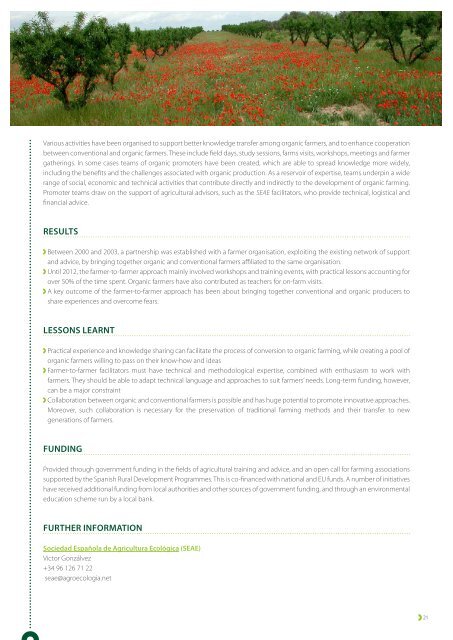ORGANIC COOPERATIVE APPROACHES TO RURAL DEVELOPMENT
Qgy8k
Qgy8k
Create successful ePaper yourself
Turn your PDF publications into a flip-book with our unique Google optimized e-Paper software.
Various activities have been organised to support better knowledge transfer among organic farmers, and to enhance cooperationbetween conventional and organic farmers. These include field days, study sessions, farms visits, workshops, meetings and farmergatherings. In some cases teams of organic promoters have been created, which are able to spread knowledge more widely,including the benefits and the challenges associated with organic production. As a reservoir of expertise, teams underpin a widerange of social, economic and technical activities that contribute directly and indirectly to the development of organic farming.Promoter teams draw on the support of agricultural advisors, such as the SEAE facilitators, who provide technical, logistical andfinancial advice.RESULTSBetween 2000 and 2003, a partnership was established with a farmer organisation, exploiting the existing network of supportand advice, by bringing together organic and conventional farmers affiliated to the same organisation.Until 2012, the farmer-to-farmer approach mainly involved workshops and training events, with practical lessons accounting forover 50% of the time spent. Organic farmers have also contributed as teachers for on-farm visits.A key outcome of the farmer-to-farmer approach has been about bringing together conventional and organic producers toshare experiences and overcome fears.LESSONS LEARNTPractical experience and knowledge sharing can facilitate the process of conversion to organic farming, while creating a pool oforganic farmers willing to pass on their know-how and ideasFarmer-to-farmer facilitators must have technical and methodological expertise, combined with enthusiasm to work withfarmers. They should be able to adapt technical language and approaches to suit farmers’ needs. Long-term funding, however,can be a major constraintCollaboration between organic and conventional farmers is possible and has huge potential to promote innovative approaches.Moreover, such collaboration is necessary for the preservation of traditional farming methods and their transfer to newgenerations of farmers.FUNDINGProvided through government funding in the fields of agricultural training and advice, and an open call for farming associationssupported by the Spanish Rural Development Programmes. This is co-financed with national and EU funds. A number of initiativeshave received additional funding from local authorities and other sources of government funding, and through an environmentaleducation scheme run by a local bank.FURTHER INFORMATIONSociedad Española de Agricultura Ecológica (SEAE)Victor Gonzálvez+34 96 126 71 22seae@agroecologia.net21


